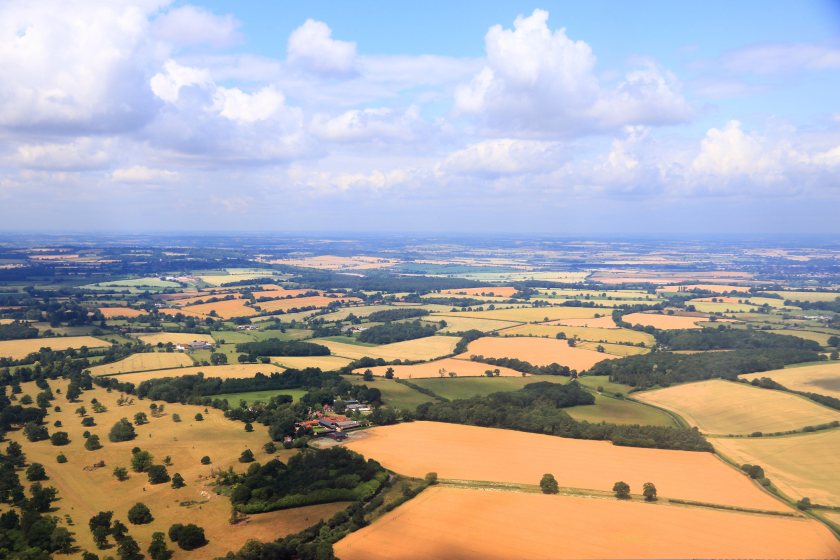Farms on fire alert: NFU warns UK countryside in 'tinderbox' state

With wildfires surging and drought spreading, the NFU is demanding urgent action from the government to protect farms, food supplies and rural communities.
The appeal follows confirmation that large parts of England are now officially in drought, intensifying concerns about the impact of extreme weather on food production and agricultural resilience.
Prolonged periods of hot, dry weather have left the countryside exceptionally vulnerable, increasing the risk to crops, livestock, infrastructure and human safety.
While farmers are taking precautions to prevent and manage fire outbreaks, the NFU is urging government, fire services, and local authorities to significantly enhance their support.
Fires can ignite rapidly and spread with alarming speed, posing a serious danger not only to farmland but also to nearby homes and communities.
In 2025 alone, the National Fire Chiefs Council has recorded over 500 wildfire incidents. Meanwhile, data from NFU Mutual shows the financial impact of farm fires rose sharply in 2023, reaching £110 million — a 37% increase on the previous year.
The NFU is calling on all fire services nationwide to invest in a newly developed adapter that allows fire engines to access water stored on farms — including bowsers and tanks — once their on-board supplies run dry.
Though this system is already being used in some areas such as Lincolnshire and Norfolk, most regions still lack the necessary fittings, making rural fire response slower and less effective.
The government is also being pressed by the union to legislate that all combine harvesters come equipped with fire suppression systems at the point of sale, reducing the risk of machinery-related fires during harvesting.
In addition, it is encouraging local authorities to introduce Public Space Protection Orders (PSPOs) to curb high-risk behaviours in the countryside, including lighting disposable barbecues and releasing sky lanterns.
Policymakers are also being urged to avoid land management changes — particularly in upland areas — that could inadvertently increase the risk of wildfires during dry weather, such as restrictions on controlled burning.
NFU vice president Rachel Hallos underlined the severity of the current situation, warning that many farms in 'tinderbox condition'.
"Fires can spread scarily quickly, putting both people and animals at risk and destroying valuable crops, grassland and infrastructure," she said.
Although farmers are taking all possible steps to mitigate the risk, Ms Hallos stressed that the challenge cannot be faced in isolation.
“It’s vital that government, fire services and local authorities work with us on prevention, education and response, and for everyone enjoying the countryside this summer to be fire-aware so these shared spaces remain safe for all.”
She concluded with a clear message: “Protecting our farmland means protecting our food, our environment and our rural communities.”
As combine harvesters roll out for the summer harvest, concerns are mounting that fire incidents could increase unless better equipment and resources are made available nationwide.
In Lincolnshire and Norfolk, a practical solution is already making a difference. Fire engines in those counties are now equipped with a specially designed adapter, developed by a local farmer, which allows them to tap into rural water supplies.
However, this equipment remains absent in most other counties, limiting fire crews’ ability to respond quickly and effectively to agricultural fires.
Lincolnshire arable farmers Andrew Ward and Rhonda Thompson experienced the value of the adapter first-hand when part of their farm caught fire over the weekend.
Ms Thompson recalled: “It was awful to get the call from a neighbour that our poultry manure heap was on fire, which is surrounded by thousands of acres of wheat – both our own and neighbouring farmers’.
“Every minute the fire was unattended added to the risk of it breaking over into the crop, where it would’ve spread quickly to neighbouring farms and been much harder to contain.
“Two fire engines arrived quickly from Nottinghamshire and Lincolnshire and, fortunately, the Lincolnshire fire engine was carrying the adapter."
She added: “I dread to think how bad it would’ve been if the firefighters didn’t have access to our on-farm water stores and neighbours’ water bowsers and tankers.
"Sadly, that’s the situation facing most farms across the country without this adapter.”








